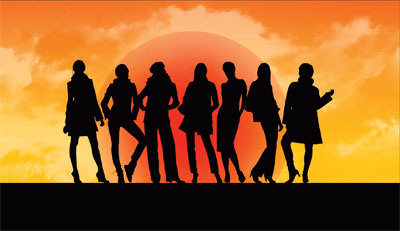 |
Gender
Forum offers you an opportunity to share your views and
concerns with us. Email to
[email protected]
or mail to Gender Forum,
C/O Features Editor, Daily News-Editorial, Lake House,
Colombo |
Feminist Movements and emancipation of Women
Ishara Jayawardane
Daily News Gender Forum spoke to Dr.
Subhangi Herath, Senior Lecturer in Sociology, University of Colombo, on
the Feminist Movement and its role in the Emancipation of Women.
Feminist Movement is a movement that supports and expects women to
achieve equality in the society. It is a movement which strives to
promote and upgrade the lives of women.
 “It is wrong to understand the Feminist Movement as a movement that
inculcates hatred against men. At one point in the history of the
Feminist Movement there was an extremely radical section of the movement
that went against men. There was a reason for that. Women have been
struggling hard for many decades to achieve equality in which they
failed due to different social reasons. Because of that they decided if
we are together with men it is not possible for us to achieve our
emancipation,” said Dr. Herath. “It is wrong to understand the Feminist Movement as a movement that
inculcates hatred against men. At one point in the history of the
Feminist Movement there was an extremely radical section of the movement
that went against men. There was a reason for that. Women have been
struggling hard for many decades to achieve equality in which they
failed due to different social reasons. Because of that they decided if
we are together with men it is not possible for us to achieve our
emancipation,” said Dr. Herath.
They decided that they had to be separated from men. They decided
they had to have their own goals, not to support the goals of
development, the goals of society, goals of humanity that have been
created by men. They decided to create their own goals and to do that
they decided to be separated from men. That was the idea behind this
radical movement.
“In that radical movement they gave up male female relationships,
entering into marriages and lesbianism was promoted. And they thought by
separating themselves from men and having their biological and social
needs from among women, that is the way to achieve emancipation. That
was the dominant movement in the US during the 50's and 60's. However
there were sections of the movement that really questioned that kind of
radicalism,” stated Dr. Herath.
In a way that radicalism turned women into men; you give up your
reproductive ability, you don't have children, you don't reproduce
biologically, you don't involve yourself in male female relationships,
you dress like men, you behave like men.
 |
|
Dr.
Subhangi Herath |
“Someone may ask me what do you mean by behaving like men? It is
again a gender construction; a maleness and femaleness.
But I’m talking about biological maleness. Giving up your biological
femaleness. You have the reproductive capacity, you have your body
created in such a way that it is different from men. But without
accepting that reproductive ability, the nature of your body and your
physical ability, you convert yourself into a male mould,” said Dr.
Herath.
Biological maleness is there, biological femaleness is there. It is a
fact it is there. It distinguishes from one another mainly because of
the reproductive capacity. The woman has a particular reproductive
capacity, the male has a particular reproductive capacity. So it is very
natural this union between men and women in order to generate the human
kind. Because of that it is very natural the attraction between men and
women.
“I'm not denying that other forms of sexuality can exist but this
natural reproduction supports the continuation of the species. So then
you deliberately give that up, deliberately prevent yourself from being
attracted , deliberately prevent you becoming attractive and put a
barrier for your reproductive ability. You change your ways, you change
your walk, change your thinking, change your habits and behave like a
man. It could be you find your emancipation through changing your
femaleness into a maleness. That is why I do not think that extreme
radicalism is something that helps us bring real emancipation for
women,” explained Dr. Herath.
Dr. Herath stated that Emancipation of Women has to be achieved
through being a woman and trying to bring justice to womanhood;
femaleness. So you have to be a female, you want to be a female, you
want to be a woman and you want to safeguard your femaleness while
trying to achieve all the goals. That is actually which should be the
agenda of the feminist movement.
All sorts of feminist segments of the old feminist movements are
still there. There are still some extremely radical feminists as well.
Ultimately whatever the form of these segments of the feminist movements
- liberal feminism, radical feminism and socialist feminism, the
ultimate goal is to promote and advance the status of women and create
equality and equity.
“When you look back in history you can trace the origins of the
Feminist Movement about two centuries back. Traces of the feminist
movement can be found in 1700's; however, this becomes a full fledged
movement in the early 20th century. Even in the 1700’s you find books
written by women talking about the exploitation of women, talking about
the underprivileged position of women in society. In the 1700's a book
called “The Vindication of the Rights of Women” by Mary Wollstonecraft
appeared. At that time to talk about the vindication of the rights of
women I suppose is a very great step. At that time the Victorian norms
about women had totally pervaded the Western world. At that time it was
like a sin to talk about emancipation of women because woman was defined
in the society as a second class citizen and it was very well accepted
that women had to be behind men,” elaborated Dr. Herath.
The words “rights of women” were not relevant for that context. And
because of that, the book did not attract any attention at that time.
There were a number of books following that, but none of these were
taken seriously until the early 20th century. It was only after a
hundred years that they became important. It was not that the language
used was very attractive or the writing style was very attractive, but
the idea that women's rights should be thought about and discussed was
very important.
“Then from the late 1800's there were a lot that were written
specially with the Industrialization, Urbanization, these two historical
processes go hand in hand with the emerging Feminist Movement at that
time because at the beginning as we know industries had only men. Men
were included. In the agricultural economy in the feudal system there
was a big place for women.
Because the agricultural economy always needs labor, so men and women
and children have to be part of the agricultural labor it is very
difficult to identify a breadwinner in the Agricultural system. But as
soon as the industries start, people go to the cities. that time cities
were emerging so people go to cities where the industries were started.
They had to abandon their families leaving women behind. Woman becomes
the total caretaker of the household. Man becomes the breadwinner. So
there is this separation of private and public,” clarified Dr. Herath.
Private is the world of women; the household; the family. Public is
the man's domain; man goes to the public; man goes to the industry; man
is the breadwinner; man goes to the city. So there is a very clear
public and private dichotomy. Household and economy both were shared by
men and women for many centuries in the agricultural system. Public and
Private both were there for men and women and both men and women had to
be part of it economically.
With this separation woman becomes a dependant. Women have to wait
for whatever is earned by the man. But ultimately because of the very
poor salaries that were paid at the beginning in the industrial system
man could not support family alone. And also there were opportunities
created for women at the very lower levels of the factories : cleaning
and packing; lower minor work where men could not be recruited. So women
were recruited for this. In one way additional income was needed for the
family, on the other hand the opportunities were available for women.
“So women also went to work in factories. This is when there was a
very clear visible vaccum in the household and family. There is nobody
to take care of the children. No one to take care of the household. This
is where the church and the women in the upper class/upper rungs of the
society stepped into this scenario. What they said is we have to support
these women, they have to do double work.
They have to work in the factories and take care of the children and
do the household work. That is when the Conservative Feminist Movement
-the first feminist movement that stepped into with their agenda of
advancing the status of women. The idea was to help women to both
activities, not to take women out of the subordinate position but to
help women do all the activities. Then it changes into Liberalism, at
that time society was becoming politically liberal and with that liberal
feminism started” explained Dr. Herath
The whole idea was to promote the education and employment for women.
Then emerges the radicalism. By educating women or giving them better
employment or giving more opportunities in employment didn't help
women's position. The more they get the more they were exploited. The
more they get the more tasks they had to complete. And because of that
radical feminists thought that they had to give up the household and
that is what the barrier was.
Female power and male powerlessness
Aditha Dissanayake
***-------------------
Time for Men’s
Liberation?
Why is it difficult to admit that men could use a little help
learning how to redefine themselves in today’s world, and how to “man
up” in a new way to meet the challenges of our modern lives?
Definition of the “Superior Man”
David Deida the author of the book, “The Way Of The Superior Man: A
Spiritual Guide to Mastering the Challenges of Woman,...” argues “It is
time to evolve beyond the (first-stage) macho jerk ideal, all spine and
no heart. It is also time to evolve beyond the (second-stage) sensitive
and caring wimp ideal, all heart and no spine. Heart and spine must be
united in a single man, and then gone beyond in the fullest expression
of love and consciousness possible, which requires a deep relaxation
into the infinite openness of this present moment. And this takes a new
kind of (third-stage) guts. This is the way of the superior man.”
Come on, let's say it together suggests Dr. Warren Farrel, the author
of the award-winning international best-seller, “Why Men Are The Way
They Are”. Dr. Farrel admits the words do not roll off the tongue all
that easily. “It sort of sticks in the back of the throat, and we almost
need to look around to make sure no one is listening before we say it
out loud.” But let's say it anyway, “Men are being oppressed”.
 |
|
The way of
the superior man |
Social scientists believe when it comes to recognizing and developing
their power, men are in a similar position today as women were in the
late 1950's, at the dawn of the Feminist movement. If feminism can be
defined as freeing females from being coerced into traditional female
roles, then the same work needs to be done for men as well.
“As long as men do not rise to the challenge of redefining themselves
for today's world, says Dr. Farrel, “women continue to be pressured to
learn how to “row on both sides of the boat,” while men keep to their
own side. The result? The boat just keeps going around in circles....” .
He feels “feminism did a great job of exploring issues of male power and
female powerlessness, but not a great job at exploring issues of female
power and male powerlessness.”
“We’ve got to wake up,” says Avivah Wittenberg-Cox, chief executive
of a gender management consultancy, in an article in the International
Herald Tribune. “We’ve got to start focusing on the guys.” The only
thing that can level the playing field at work is a level playing field
at home. And that requires a major shift in public policy and corporate
culture.
More and more governments all over the world protect female jobs
during maternity leave, and several offer mothers a right to cut back
their work hours.
In the corporate world, (female) human resource officers lobby for
flexible work time, while other (female) executives organise female
mentoring programmes. Female executive networks where the ladies can
bond are booming. At countless women’s conferences, women debate with
women about women and bond some more.
What about the men? Surely the liberation of women has made massive
implications for men. It is clear that the women's movement together
with economic independence have changed the relationship between the
sexes making drastic changes in the expectations of how men should
behave as fathers, husbands and sons of the “liberated” women.
In the past men were supposed to be strong hunter gatherers because
this was how society survived. With the changes brought through the
women’s movement however, today, the focus is more on the feminine
values like sharing and caring.
The result? Confusion where once confidence reigned. Confused,
unsure, angry and threatened by the gains women have made, (in some
households, being supplanted as top wage earner) has, according to
social scientists, triggered men’s insecurity. Some men feel they’re
paying a steep price for sharing power: not just losing control but
self-respect as well.
 |
|
Infinite
liberation |
Others believe the advances women have made, increased job and career
opportunities, improved wages, better child care, have come at men’s
expense.
But the sad truth is men, wrestling with the same issues women used
to have four decades ago, usually do so in private. While women have
been public about their struggle to balance the world of work and career
with that of relationship and child rearing and have public
conversations in the media showcasing they are not alone, men have too
often been silent and isolated. “In groups I’ve facilitated and with
individual men I’ve counseled, I’ve heard the same refrain: “I was
always too ashamed to talk about it.” says a psychologist in the online
publication, “Women's enews.”
Enter the men's liberation movement; The social movement that
includes a number of philosophies and organizations that seek to support
men, change the male gender role and improve men's rights in regard to
marriage, child access and victims of domestic violence. In other words,
according to “Time” magazine “hundreds of men have joined groups that
hold monthly or weekly “consciousness-raising” sessions, discussions in
which they air their anxieties and strive for better understanding of
women—and themselves.”
Concerns often raised by men's rights advocates include; the neglect
of male issues and structural oppression of men (often citing issues
such as the fact that in the Western world, men succeed in committing
suicide much more often than do women,that men constitute over 90% of
the prison population and represent a majority of alcoholics, and drug
addicts.
If this is so, who is the most liberated sex right now? Women,
surely. In which case, women must give up thinking “If he has it, then
I’ve lost it,” and share this new found freedom with men. For,
liberation, like love has an infinite supply.
[email protected] |



